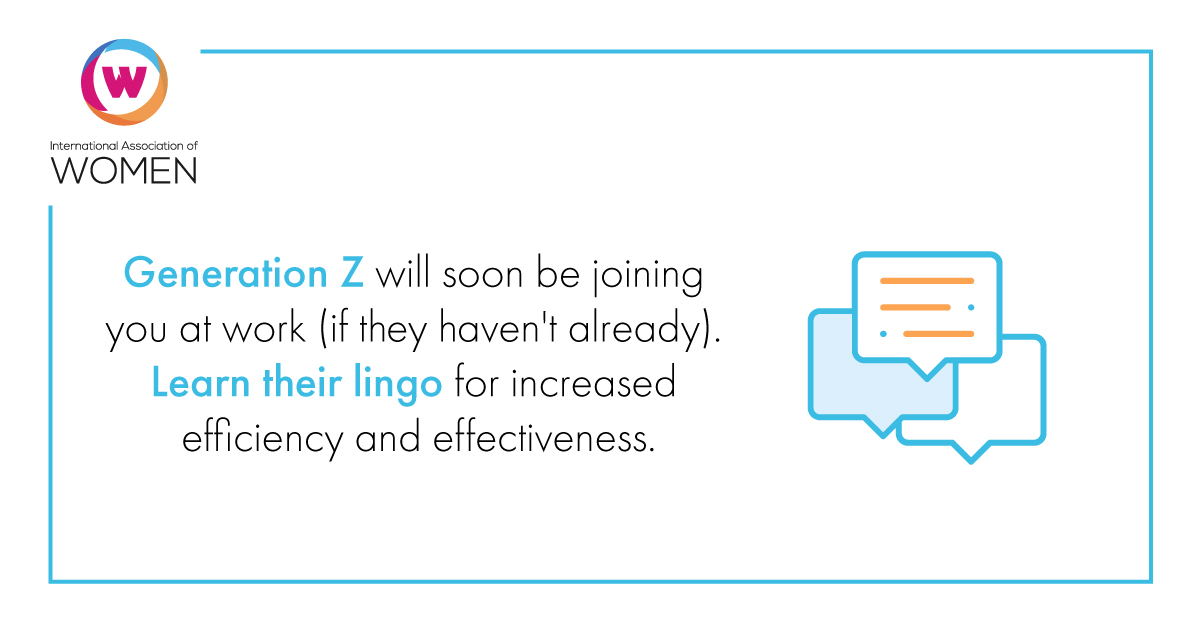By Mat Probasco
As the much-celebrated Millennials become the youthful norm in the workforce, we—the older generations––adjust to their style of speech and word choices. Now, 18 years after the millennial calendar change, it’s probably a good time to prepare for the next lexicon shift: that of Generation Z.
Some newer office terms include:
Side hustle: This is a secondary source of income—the twenty-first-century version of moonlighting.
Pivot: The traditional definition—moving from one position or stance to another—still applies but it’s aimed toward a career trajectory. It could mean changing jobs or adjusting outlooks.
Unicorn: Initially referring to a sleeper initial public stock offering or one with boundless potential, “unicorn” is now often used to refer to someone who is unique in his or her ability and strategically placed to use that uniqueness.
Gen Z grew up online on social media and incorporates this terminology broadly. Know about the ‘gram (Instagram), the chat (Snapchat), and swiping right (look it up!) or be prepared to be lost. Some Baby Boomers are quite lost by the difference between hashtaging (#, a topic) and tagging someone (including someone in a photo or conversation). Gen Z grew up avoiding scams like phishing (con artists using baited email to obtain personal information such as usernames or passwords), spearphishing (a phishing attack targeting a specific person), and catfishing (seeking personal data by creating a fictional online persona and pretending to be a new friend or romance prospect).
In part due to Gen Z influence, office talk has become increasingly full of acronyms:
PTO: paid time off (paid vacation days)
ESO: employee stock option (an opportunity to invest, maybe at a fixed rate or as part of a compensation package)
FMLA: Family Medical Leave Act (unpaid time off for medical emergencies or maternity)
It’s worth noting that there’s some difference of opinion about what Generation Z really is. Some say it’s those born after 2000; others say it’s those born after 2001. We’re going to be broader and go with people born between 1996 and 2010. It’s also worth noting that regional word choices and the lightning-fast nature of language change could make any of these terms ubiquitous, obsolete, or outright incorrect by the time you finish reading this. Nonetheless, here are a few to look out for:
Real talk
Thankfully, “real talk” is very obvious. It means an honest, objective opinion is forthcoming. A difficult truth is about to be discussed in an unvarnished way—a version of “I’m going to give it to you straight.” It can set up delivery of sincere criticism or also signal a serious compliment.
“We’ve been meeting about this for weeks, so, real talk, let’s resolve it right now.”
“You are late again. Real talk: One more time, and I’ll have to let you go.”
“OK, real talk: I love your hair so much these days.”
Ghosting
Usually reserved for personal or romantic affairs, ghosting refers to retreating or completely disappearing rather than ending a relationship. The same can happen in the professional world.
“I thought they would be a customer forever, but when I called to take their new order, I found out they’d been closed for weeks. I’d been ghosted.”
Tea
While the beverage has been around forever, this new meaning of “tea” may be more ephemeral. It could catch on or fade away. Tea in Gen Z parlance means gossip. It’s the dirt being dished, and if there’s a flavor or varietal added, it means particularly juicy gossip.
“I have tea to spill on Joe and Judy.”
“Oh, you’re spilling Joe and Judy tea. Well, I have chamomile on them.”
“Joe and Judy? That’s old news. Weak tea.”
Lit and Fire
When something is catchy, exciting, new, fun, or likely to be remembered for its positive attributes, we may say it’s hip, hot, cool, fab, dope, sweet, wicked, etc. Gen Z is more likely to say it is lit or fire. Lit tends to be more about an activity or setting. Fire is more often about an object or movement. This is different than being “on fire,” which is a basketball term meaning everything is going perfectly and will likely continue that way.
“This party is lit! The DJ is fire!”
“Everyone’s lit from the holiday bonuses.”
“The new logo is fire.”
Flow
Flow most likely comes to us via the hiphop world. It’s a rapper’s rhythm, cadence, rhyme, and topical pattern and substance. In regular language, it’s become a crossover between the invisible life force behind existence and how we go about the everyday humdrum duties on our to-do lists. Flow is what we set out to do and how we do it—our intention and our method. We hear the word most often when something or someone is impeding our flow.
“My day job is screwing up my flow.”
“All this rain is messing with my flow.”
“Nonstop sales: That’s my flow.”
Zayum!
This exclamation might seem silly, but consider Millennials’ “Snap!” or Gen X’s “Holy cow!” How much sense do those make? Zayum is a form of “damn!”—not in its negative aspect, but meaning surprise. It’s heartening to have exclamations that aren’t considered curse words, even mild curse words such as “damn.” Zayum is completely welcome in our office.
“We won the bid? Zayum!”
“Zayum, you look good today!”
“It’s a little warm in the office, and then the air conditioning turns on and—zayum!—it’s suddenly the Arctic.”
There are countless more new office/workplace terms on the rise. Have you been left struggling to communicate with younger generations? Comment below and let us know what words and/or phrases have left you scratching your head!





“Holy cow” predates Gen X . We were more about “fresh”, “bad”, and “tubular”